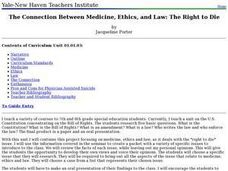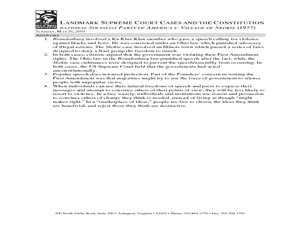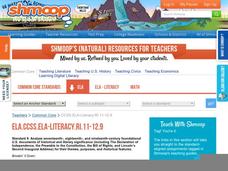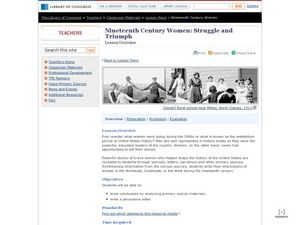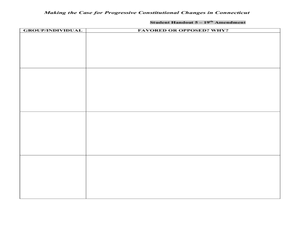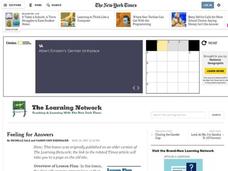Curated OER
The Fight to End "Separate but Equal" in American Schools
Middle schoolers study the court cases related to Brown v. Board of Education and the "separate but equal" standard established by Plessy v. Ferguson. They create an informational display that can be used to teach others the particulars...
Curated OER
You and the Law -- Beating the Odds
Middle schoolers examine the rate of institutional racism in the United States. Individually, they write in their journals about how they can make better choices and increase their self-esteem. Using historical documents, they identify...
Curated OER
Is the Internet Igniting Violence?
Students explain how various issues regarding restrictions on the Internet are impacted by the First Amendment of the United States Constitution, particularly in light of the recent school shooting and bombing in Littleton, Colorado.
Curated OER
Is It Right to Bear Arms?
Students explore the debate on how to curb gun violence in America. They prepare an argument for or against a strict interpretation of the Second Amendment of the United States Constitution and participate in a debate.
Curated OER
The Connection Between Medicine, Ethics, and Law: The Right to Die
Students in a special education class examine the United States Constitution. Using the text, they answer five research questions and discuss the amendments that concern medicine, ethics and law of the right to die issue. They develop...
Curated OER
Visualizing School Equity
Students examine how school segregation is affected by funding gaps. In this equity instructional activity,students read the article, "Crossing the Gap." Students analyze funding gaps between schools. Students understand that every...
Curated OER
Justice Demands an End to Segregation, But it Does Not End
Students define human rights and describe how it applies to politics, economics and cultural rights. As a class, they watch a video how the Constitution was made and discuss its purpose. In groups, they present information to the class...
Curated OER
Passin A bill In The Senate
Young scholars examine the passage of a bill in the Senate with particular attention to amending bills in Australia. They recognise the potential for minor parties and Independents to hold the balance of power in the Senate. They...
Curated OER
Landmark Supreme Court Cases and the Constitution: National Socialist Party of America v. Village of Skokie (1977)
Students examine the impact of court decisions. In this Supreme Court lesson, students read the National Socialist Party of America v. Village of Skokie (1977) case study regarding First Amendment Rights. Students take notes on the case...
Curated OER
Government: War Powers Limitations
Students examine historic examples of authority during wartime. They interpret the Fifth Amendment. They debate the merits of the Patriot Act.
Shmoop
ELA.CCSS.ELA-Literacy.RI.11-12.9
Guided by close-reading questions, groups examine the similarities and differences between the Declaration of Independence and the Bill of Rights. In addition, they look at how the principles are presented in these two foundational US...
Center for Civic Education
What Is Authority?
Young scholars examine the concepts of power and authority as they begin learning about government in this elementary social studies lesson. Through a series of readings, discussions, and problem solving activities, children learn about...
Center for History Education
Women's Rights in the American Century
Today, many young people find it hard to understand why it took over 150 years for women in the United States to get the right to vote—why there was even a need for the suffrage movement. As they read a series of primary source...
NPR
Same-Sex Marriage
The battle over same-sex marriage is a prevalent issue in the United States, and a valuable topic to be discussed in your social studies classroom. Here is a basic outline of introductory questions, focus questions, vocabulary, and media...
Curated OER
Arrests and Investigatory Stops
Students define arrest and detainment, examine hypothetical situations to determine if warrantless arrest/detainment is reasonable based on information available to police, discuss differences between hunch, suspicion, reasonable...
Curated OER
U.s. Constitution Roll Call Test
Students act as newspaper reporters from 1787 and interview some of the signers of the Constitution. They study the contributions of these Founding Fathers: Washington, Franklin, Madison, Hamilton and discuss the purpose of the U.S....
Curated OER
Ninteenth Century Women: Struggle and Triumph
Young scholars examine the role of women in US society during the 19th century and how this role evolved and changed in time. They then write a persuasive letter that domonstrates their comprehensin of the subject.
Curated OER
Making the Case for Progressive Constitutional Changes in Connecticut
Students take a closer look at Constitutional Amendments. For this Progressive Era lesson, students discover how the amendment process works and then examine 4 amendments proposed during the era in Connecticut. Students research primary...
Curated OER
Constitutional Change During the Progressive Era
Pupils analyze the passage of the 16th through 19th amendments during the Progressive Era around the turn of the century. Using research skills, they write papers and create portfolios supporting and opposing the adoption of each...
Curated OER
The Jury System
Students analyze Article III and the Seventh Amendment. In this US Justice lesson plan, students research the US jury system and complete a Student Jury questionnaire. Students will discuss the impact the implementation of the Jury...
Curated OER
Citizen Juries: Zacarias Moussaoui - May 1, 2006
Students consider deliberations by juries. For this citizen jury lesson, students complete readings regarding the constitutional right to a trial by jury as well as on the civic responsibility to serve on a jury.
Curated OER
The Voter
Students identify the constitutional amendments and major federal laws that have shaped suffrage in the United States.
Curated OER
INTRODUCTION TO THE PERIODIC TABLE
Learners identify the scientist who first wrote the Periodic Table, identify the scientist who amended the Table, state (or write) specific data relating to the history of the Periodic Table, identify at least five elements, and two...
Curated OER
Feeling for Answers
Students consider the legal issues related to a suicidal or depressed college student by reading and discussing the article, "Laws Limit Options When a Student Is Mentally Ill." They write essays considering how the events at Virginia...






